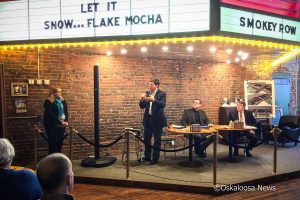Eggs & Issues Spark Debate Over Education and Regional Airport

Smokey Row once again played host to Eggs & Issues. The winter forum allows area residents to ask questions of policy makers.
Oskaloosa, Iowa – It’s a yearly staple of politics in Mahaska County, and the opening round of the yearly community question and answer forum started off where last year’s ended: education and an airport.
Moderator, Kathy Rothfus, asked Mahaska County Supervisor Mark Doland about an agenda item for the Tuesday meeting. That item will seek to have Mahaska County removed from the 28E agreement, between the county and its two partner towns of Pella and Oskaloosa, to build a regional airport.
“It’s probably not a surprise that’s my position,” said Doland, who generated the resolution that will be taken up on Tuesday’s meeting. “It’s been my position since I was elected.”
Doland claimed that he is having difficulty getting information about the project from the FAA and the South Central Regional Airport Agency.
Doland referenced a resolution passed nearly two years ago by the county to remove eminent domain from the 28E agreement. That resolution was subsequently not passed by the city councils of Oskaloosa and Pella and all three parties of the agreement must pass any changes to the agreement.
The potential closure of 220th Street was another aspect Doland pointed to with regard to the resolution, saying an alternative to the road closure hasn’t been addressed.
“So, the agreement – in totality – I’m not in favor of,” added Doland, “I don’t want to be a part of that agreement moving forward.”
Mahaska County Supervisor Henry “Willie” Van Weelden commented on Doland’s remark about not getting information. “I’ve gotten all of the information I need. All it takes is a phone call.”
“I’ve always gotten the information,” added Van Weelden.
Doland rebutted Van Weelden saying that he had asked to be placed on the list that goes out announcing the meetings. “I was put on there at the very beginning of my term and then was removed from it somehow.”
According to Doland, he’s asked for information going back and forth between the SCRAA and FAA and was told that the information was “pre-decisional, they don’t have to give me any information.”
“As far as that resolution, when I left the courthouse Thursday afternoon, and went and checked the agenda, it was on there. But I have not received a copy of it yet,” declared Van Weelden, who said it was premature to take up at the next meeting when the board members haven’t seen the resolution.
The SCRAA meeting will be held on January 31, 2017 at 6:00 p.m. at the Pella Public Safety Complex, 614 Main Street, Pella, Iowa.
In terms of education, the focus was on whether home-schooled students would be tested and how funding for education may take place in the future. Education savings accounts is a program in which the state will set aside money based upon a per-pupil formula for funding by the state.
In the program, a student’s parents or guardians could withdraw the money that would have been spent on the student by the public school and may then spend it on educational expenses, approved by the guidelines. That money could then be used for tutoring, transportation, online courses and, in the most contested part of the program, could be used for private schools.
Reiter said that he does not favor education savings accounts. “Those savings accounts will end up going to those parents who chose to send their kids to a private school.”
“Those are public dollars, going to help parents to privately educate their kids,” added Reiter, “If they [Iowa Legislature] want to provide those dollars, then I would say they better find additional monies and not take it from the K-12 [budget].”
“I’m an advocate for public education,” added Reiter.
Tyler Rager, a field director with Americans for Prosperity in Des Moines, disagreed with Reiter.
Rager said that local dollars and federal dollars would still be made available to the local K-12 school district, but only state dollars will be used for the education savings account. “In reality, you’re going to see more dollars per-pupil at the public schools with education savings accounts.”
Rager’s reasoning for his comment was that there would be more money per pupil, since the previously allocated local and federal dollars would continue to flow into the district, without the pupil actually attending school in the district.
Rager rebutted Reiter’s comment about public dollars, saying, “actually they are our dollars,” and for some low-income families, the opportunity to apply those dollars to another educational option.
“Right now, we have a system where the people who want private education are the one’s who can afford it; the better-off families. That’s a policy that results in the lowest income families being hurt and being forced to go to public schools,” added Rager.
After the recent presentation about a homeschooling program at the latest school board, questions were asked about homeschooling and testing.
Reiter explained that homeschool students need to be tested if they are in a CPI [competent private instruction] program. “There is a requirement that parents must test their children and keep them on track at a certain level.”
“If they do an IPI, there is no testing needed,” added Reiter. “However, there is virtually no assistance from the school that will take place. They are completely on their own,” added Reiter.
Reiter explained that under a homeschool assistance program, in which the district provides a teacher to work with students and families around the district, students are not required to be tested every year.
The next Eggs & Issues is scheduled for January 28th starting at 8:30 am inside Smokey Row Coffee on the west side of the square in Oskaloosa.















